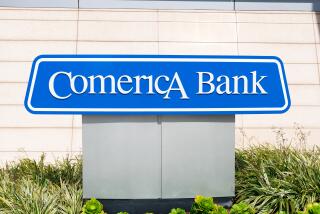FDIC Advances $1 Billion for Bailout of Ailing Texas Bank : Rescue Package Could Ultimately Rival the Largest
- Share via
WASHINGTON — The Federal Deposit Insurance Corp. today advanced $1 billion to banks owned by First RepublicBank Corp., a Dallas holding company, in a rescue package that could ultimately rival the government’s largest bank bailout.
FDIC Chairman L. William Seidman called the assistance “an interim step” to provide needed stability to First Republic’s subsidiaries and depositors.
Seidman said his agency, which insures deposits at commercial banks, will guarantee all the subsidiary banks’ deposits as well as money owed to general creditors of the banks. Creditors of the holding company are not protected by this arrangement, he said.
The action goes beyond the minimum the agency would normally be expected to back up, which is deposits of $100,000 and less.
First RepublicBank is the 13th largest in the nation, with $33.2 billion in assets and 73 subsidiary banks. The holding company reported a loss of $656 million last year.
First RepublicBank acknowledged Tuesday that it had been forced to seek federal aid because of a deteriorating loan portfolio and difficulty in raising deposits.
Runoff of Deposits
A First RepublicBank spokesman said Wednesday that the bank had experienced a runoff of deposits the day before but that the situation apparently had stabilized. An earlier drain of deposits and customer defections had forced it to begin preliminary discussions with the FDIC, the spokesman said.
Seidman said the FDIC is seeking a long-term solution to the holding company’s problems and is talking to private investors who may want to participate in a restructuring of the company.
He declined to be more specific, but in past transactions the agency has provided insurance money in conjunction with an infusion of funds from private investment groups.
The largest-ever bank rescue was the $4.5-billion rescue in 1984 of Continental Illinois National Bank & Trust of Chicago. The FDIC expects to recoup much of its initial outlay in that bailout, and expects its ultimate cost to be about $1.7 billion.
Seidman said he could not say what the eventual cost of the First Republic rescue would be. However, he noted that First Republic and Continental are about the same size.
He said that unlike the case with First Continental--a failure attributed to mismanagement--”it’s very clear the primary reason for this problem is the economy of Texas.”
To Assume Some Control
Seidman said the FDIC will assume some control of the subsidiary bank’s operations, although not day to day. He said the current bank’s management will remain in place for now, but said changes could be discussed later.
Sen. Phil Gramm (R-Tex.), who appeared at a news conference with Seidman, said that despite a record number of bank failures, the Texas economy is on the mend. “We feel we’re in the backwash of a tidal wave that hit the Texas economy about two years ago (with the collapse of oil prices). . . . The basic economic future looks bright when compared to the recent past.”
The $1-billion advance is in the form of a six-month note from the FDIC.
The subsidiary banks are pledging their stock as collateral for the infusion, and the parent company is guaranteeing it.
The collateral is being pledged by 29 of the subsidiary banks, representing about 80% of the holding company’s assets.
The FDIC reported a post-Depression record of 184 bank failures last year, more than half in the oil-rich states of Texas, Louisiana and Oklahoma.
So far this year, 38 commercial banks have failed nationally.
More to Read
Inside the business of entertainment
The Wide Shot brings you news, analysis and insights on everything from streaming wars to production — and what it all means for the future.
You may occasionally receive promotional content from the Los Angeles Times.








